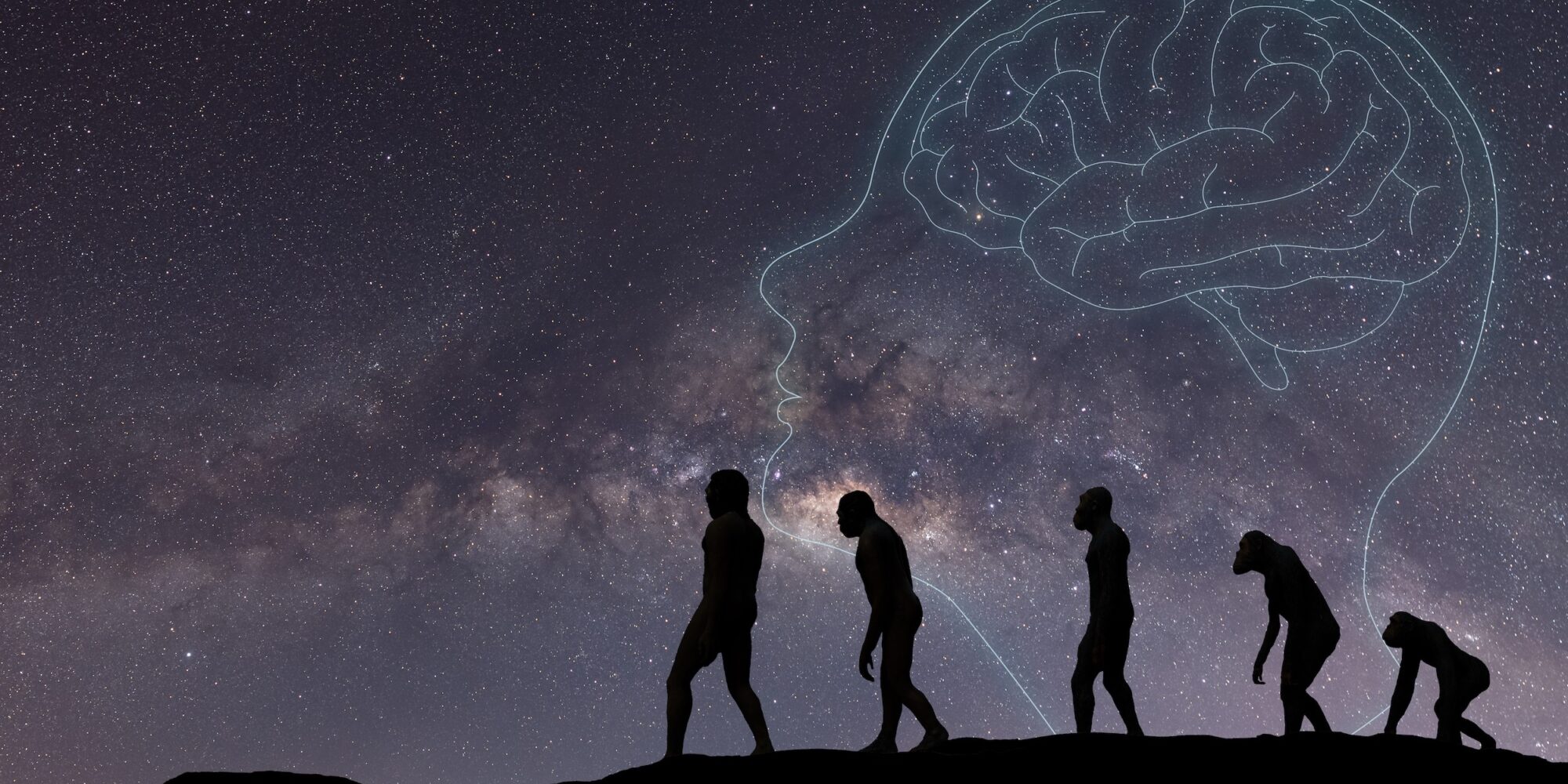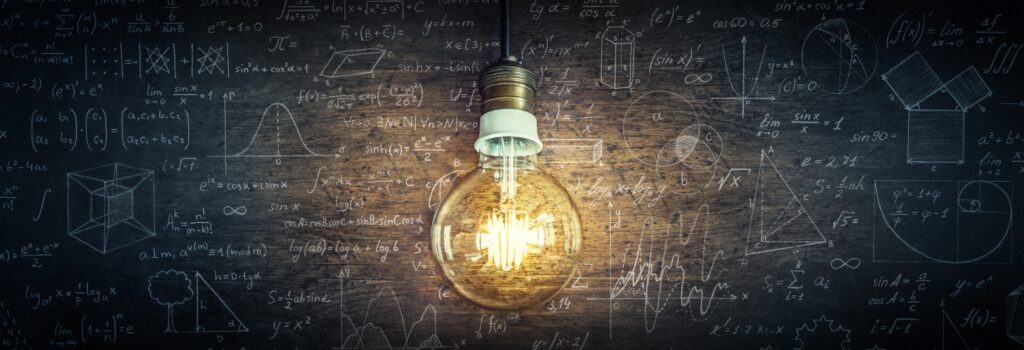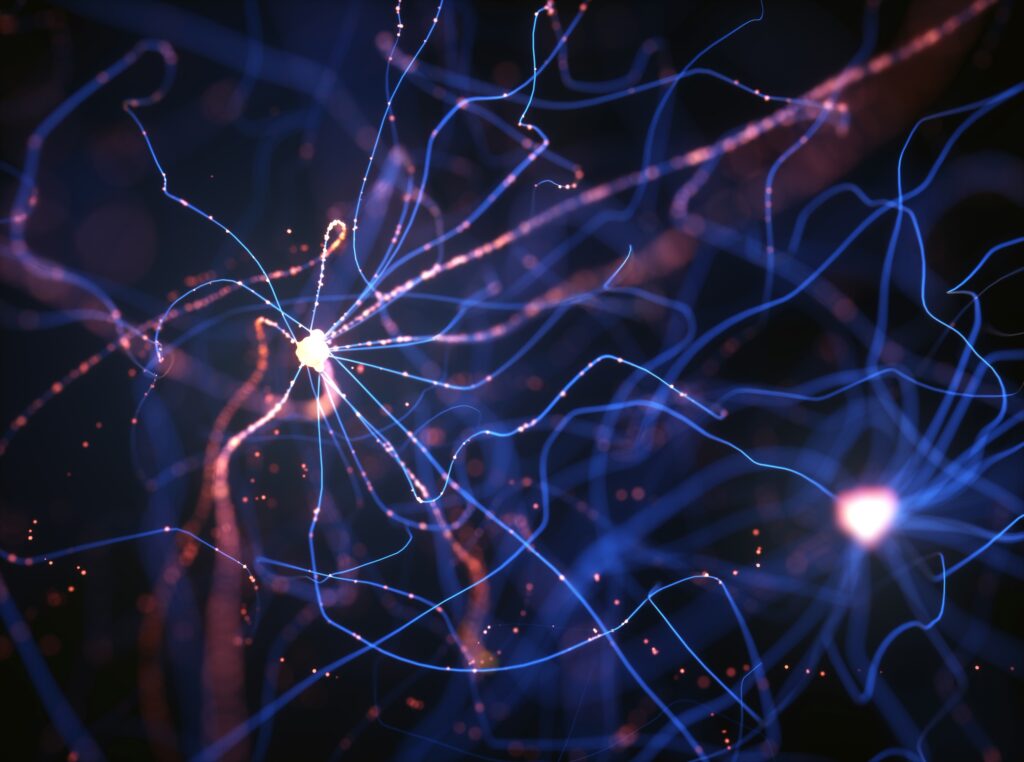Why evolutionary theory contradicts materialism
Reading | Evolutionary theory
![]() Richard Oxenberg, PhD | 2023-04-30
Richard Oxenberg, PhD | 2023-04-30

Evolutionary theory not only fails to account for the putative emergence of consciousness from a non-conscious, material substrate, but it also outright contradicts materialism by implying that subjective states have causal powers in and of themselves, argues Dr. Oxenberg. His argument is explicit, conceptually clear, original, compelling, and we could not find a way to refute it. It is an argument not against evolutionary theory, but precisely based on it. Dr. Oxenberg then goes on to conclude that “the truth of evolutionary theory is consistent with a fully informed and rational spiritual faith.”
My thesis in this paper is a fairly simple one, and one, I believe, that is fairly simple to support on rational grounds—although I imagine it will prove controversial among some dedicated to a philosophy of ‘scientific objectivism.’ But the thesis can be stated simply enough: A materialist interpretation of evolutionary theory cannot account for the subjective dimension of life and, in particular, cannot account for the desire for physical survival, which it presupposes. When we analyze evolutionary theory with care we discover, somewhat astonishingly, that it is actually inconsistent with a philosophy of metaphysical materialism. A full recognition of this undermines the claims of evolutionary materialists (such as Richard Dawkins and others) who have advanced and popularized the notion that the truth of evolutionary theory implies the falsity of religious belief.
But before considering my thesis let me first of all clarify it. I want to be quick to say that when I speak of the limits of evolutionary explanation I do not mean this in the sense in which Intelligent Design (ID) theorists say that natural selection cannot account for irreducible complexity. The ID theorists argue that irreducibly complex organic systems cannot result from natural selection, as each element of the system would need to be selected for independently. This is a more or less straightforward rational argument based upon a key premise of natural selection theory: that only what bestows a survival advantage is selected for. If, say the ID theorists, the elements of an irreducibly complex system do not each bestow a survival advantage, then the logic of natural selection itself implies that they cannot have resulted from it. On this basis, it is argued that such systems must be accounted for by something else; in particular, some deliberately acting intelligence. This is the basic argument of ID theory.
Evolutionists answer by denying that there are, in fact, ‘irreducibly’ complex systems. They maintain that the examples of irreducible complexity provided by ID theorists can indeed be shown to be reducible to elements that would have bestowed survival advantage when they first appeared. In some cases, this can be demonstrated more or less directly. In others, say the evolutionists, it is reasonable to assume it on the basis of the general success of natural selection theory. In other words, the evolutionists claim that the explanatory gaps ID theorists profess to find in natural selection theory simply do not exist.
My argument differs from this. It does not seek to demonstrate gaps in the explanatory power of evolutionary theory, but to show that evolution’s explanations do not reach as far as the evolutionary materialists (e.g., Richard Dawkins, Daniel Dennett, E. O. Wilson, Richard Lewontin, etc.) suggest. Indeed, I maintain that a careful consideration of natural selection theory itself calls into question the assumptions of metaphysical materialism. To see this, however, we will need to attend closely to the logic of natural selection theory.
That logic is straightforward and can be expressed simply: In order for a trait to be ‘selected for’ it must meet two criteria: (1) It must exist. It must be present in some entity. Nothing can be selected for that does not already exist. (2) It must be such as to bestow a survival advantage on the entity that possesses it.
Criterion (1) alone is sufficient to indicate the explanatory limits of natural selection theory. This theory is often said to be a theory of origins (of course, Darwin’s revolutionary work was entitled The Origin of the Species), but in fact natural selection as such does not explain the ‘origin’ of anything. Given that only traits that already exist can be selected for, the origin of those traits must be attributed to something other than selection. This is obvious enough and would be uncontroversial if it were not for the way that evolutionary theorists often slip into a casual, teleological mode of speaking, as if this or that trait were intentionally produced by natural selection for the purpose of fulfilling this or that survival aim. Among the most flagrant examples of this sloppy mode of speaking is the title of Richard Dawkins’ popular bestseller, The Selfish Gene. The word ‘selfish’ suggests an intentionality that is contrary to the actual logic of evolutionary theory. Of course, the evolutionists themselves understand this to be a shorthand—and scientifically sloppy—way of speaking. It is, however, more than sloppy; it is misleading. It involves the logical blunder of mistaking an effect for a cause.
According to natural selection theory, survival advantage is the effect of traits that are then selected for because they have that effect. The giraffe’s long neck, for instance, is not produced in order for the giraffe to reach the high leaves; rather, the giraffe is able to reach the high leaves because it has a long neck. What then is the origin of the long neck? Natural selection theory cannot answer this question. Evolutionary theory in general answers ‘random mutation.’ But what kind of an ‘origin’ is this? What is ‘random mutation’?
Mutation simply means change. Of course, in order for something to change, randomly or otherwise, it must first of all exist, and in two distinct ways. The medium that undergoes the mutation must exist as the substratum of mutation, and that into which that medium changes must exist in potentia as a real possibility of that substratum.
For example, in order for the gene that determines the length of the giraffe’s neck to mutate into a gene that produces a longer neck, that gene must, first of all, already exist, and, second of all, must have the potential to mutate in just the way it does. Of course, it is entirely possible, logically, that genes in general would not have that particular potential. Even more to the point, neither the existence of genes nor their potentialities have their ‘origin’ in random mutation. The term ‘random mutation’ describes a process; it tells us nothing of the origin of that which undergoes the process. It does not answer the question of how the universe comes to be a place that makes possible such genes. Carefully considered, then, neither the theory of natural selection nor the theory of random mutation provide insight into the origin of living traits and processes.
These two ideas—natural selection and random mutation—constitute the core of Darwinian evolutionary theory. Neither provide an explanation of the origin of living entities. Thus, evolutionary theory is not actually a theory of ‘origins’ at all. It describes processes, but yields no insight into the origin of that which undergoes these processes. It describes how, it does not explain wherefrom. But it is this latter that we would need to understand if we wanted to understand the nature of life in its essence.
At this point, however, we can hear the evolutionary theorist object. The question evolutionary theory answers is why organic systems have the functional organization they do. Before Darwin, this organization was thought to be the work of a supreme intelligence who crafted these systems in just these ways for a divinely ordained purpose. After Darwin, we were better able to explain this organization as a function of strictly natural, i.e., material, processes. So, the evolutionist says, Darwin’s theory does indeed explain what was unexplained or poorly explained before, and does so through appeal to strictly natural, i.e., material, processes.
True enough. But a great deal hangs on just what we are to understand by the word ‘explain.’ What is explained by Darwinian theory is the manner in which living systems become organized. What remains unexplained is the ultimate nature of these living systems. It is this nature we must understand if we are to assess the ultimate potentialities of life. And it is these potentialities we must understand in order to assess the rationality of the religious impulse. Evolutionary theory does not address this. For sure, the evolutionary materialists contend that evolutionary theory implies that the nature of life will be (or can be) understood in entirely material terms.
Were this true it would indeed undermine most religious interpretations of the meaning of life. My contention, however, is that evolutionary theory implies no such thing; indeed, it implies the opposite. We can see this most clearly by applying our analysis of the limitations of evolutionary explanation to the non-material, subjective features of life we are familiar with through introspection.
It is a commonplace of evolutionary discourse to speak of the ‘competition for,’ or ‘struggle for,’ survival. Given the intensive struggle for survival we see among living systems, we are told, only those that are well adapted to the conditions of survival can persist from generation to generation. Those less well adapted fall by the wayside. This is the logic that drives natural selection. What is seldom noted with respect to this discourse, however, is that the very use of the term ‘struggle for survival’ takes us beyond the conceptual bounds of metaphysical materialism. Material systems as such may affect one another, but they do not struggle with one another. The word ‘struggle’ implies intentionality and purpose. A ‘struggle for survival’ implies a desire to survive. We have immediate knowledge of the existence of such desire, for we experience it within ourselves. What is its origin? How has it arisen? What is its essential nature and ultimate thrust? As we’ve already noted, evolutionary theory cannot answer these questions.
But, given the sloppy way evolutionary theory is often expressed, even by those who know better, it behooves us to put a finer point on this. Surely the desire to survive is selected for, some might say. Those who have a desire to survive are much more likely to behave in ways that will further their survival than those who do not, hence the desire to survive confers a clear survival advantage.
This is true enough (although its implications are not at all what the materialists might suppose, as we shall see in a moment). But, again, to suppose that this explains the desire to survive is to mistake an effect for a cause. The survival advantage conferred by the desire to survive is an effect of that desire, not its cause. The selection that then takes place is the effect of the survival advantage. The cause of the desire is not at all given by natural selection theory. It is not even addressed by it. Nor, for reasons stated above, does the idea of ‘random mutation’ provide a causal explanation. The origin of this desire is a pure mystery.
More broadly, the origin of the subjective in general is a pure mystery. No insight into this is provided by evolutionary theory. No one has, or can, explain the mechanism through which a material gene, however randomly mutated, results in thinking, feeling, caring, hoping, loving, etc. Neither the origin nor ultimate nature of these subjective states are given by evolutionary theory. True enough, evolutionary theory tells us that if subjective states are traceable to our genetic structure, then those states will be subject to selective pressures. But this tells us nothing at all of their origin or ultimate nature. Nor does it shed any light on how the subjective can emerge from the material.
As some will note, this is simply the mind-body problem considered in the context of evolutionary theory. My point in bringing it up in this context is simply to indicate that evolutionary theory in no way resolves it. This again highlights the limits of evolutionary explanation, and in a particularly striking way. After all, what we are subjectively is what we are most intimately and immediately. Our subjectivity is our immediate presence to ourselves. Without it, we would not be what we are. If we wish to understand our origin and ultimate nature, then, it is the origin of this subjectivity we must understand. Evolutionary theory provides no insight into this.
But we can take this point a step further. Indeed, we can turn the materialist argument altogether on its head. How, we might ask, can the desire to survive—a subjective state—confer a physical survival advantage? It can do so only by affecting physical behavior. The natural selection argument in this instance goes something like this: animals who desire survival are, for that reason, more likely to act in ways that further survival than those who do not. Hence, they are more likely to be winners in the struggle for survival and the desire for survival is ‘selected for.’ But this will only be true to the extent that desire—again, a subjective state—can have physical efficacy. Somehow this mind-state must be able to reach into matter, the matter of an animal’s body, and affect its behavior. To the extent that we were to understand evolutionary theory as grounded in, or as implying, metaphysical materialism, this would make no sense. How can a mere subjective state physically move a material body? On materialist grounds it cannot. This leads us to a startling conclusion: In order for the desire to survive to have any bearing on natural selection at all, metaphysical materialism must be wrong.
We can flesh this out by examining what we are calling the ‘desire for survival’ in closer detail. It might be pointed out that the phrase ‘desire for survival’ is an abstraction. In fact, we don’t desire ‘survival’ per se, but the furtherance of pleasurable states and the avoidance of painful states. It just happens that natural selection associates pleasure with survival and pain with threats to survival. If the opposite were the case we would desire our demise. Fair enough. But how are we to understand how such an association occurs? In order for the subjective states of pleasure and pain to become associated by natural selection with survival and threats to survival, those states must have the power to induce survival-relevant behavior. After all, it is behavior that is either selected for or selected out by tending to promote or undermine survival. In order for an association of pleasure with survival-promoting behavior to be selected for, the subjective state of pleasure itself must have the power to modify behavior. If subjective states couldn’t affect behavior, they would have no bearing on selection. But how, on materialist grounds, can subjective states modify physical behavior?
What we would expect, on materialist assumptions, is that there would be no subjective states at all. Of course, we know this not to be the case. In the face of the undeniable fact of subjective states, then, materialism maintains that these states are mere ‘epiphenomena,’ i.e., irrelevant to the causal nexus of the material world. But this is just what natural selection shows is not the case. If subjective states were irrelevant to material causality, they would have no correlation with survival-relevant behavior. We would expect a random distribution of these states, and expect them to have no affect on, or association with, behavior.
But we do not find a random distribution of subjective states; rather, we find that positive (i.e., desirable) states are, by and large, associated with survival-promoting behavior and negative states with survival-threatening behavior. Again, this could only result from natural selection if these states can reach into the physical world and change it. But if they can, then this means the subjective—i.e., the non-material—must have physical efficacy. This altogether contravenes the assumptions of materialism.
The materialist would likely counter that these states are not merely subjective, but have material counterparts in the brain or nervous system. Neurological study leaves little doubt that this is so. On this basis, the materialist would argue that it is not the subjective quality of the state that affects physical behavior but its material, neurological counterpart. This would allow all causality to remain on the material plane. Fair enough. But then how to account for the fact that these subjective states have just these subjective qualities? Why, for instance, does the material counterpart of pleasure feels good subjectively? Why does pain, or the physical counterpart of pain, hurt? The materialist can give no plausible explanation for this. If everything results from strictly material interactions to which the quality of subjective states is irrelevant, then the subjective qualities of pleasure and pain would have no efficacy. Not only would there be no need for these subjective qualities to be as they are, but, even more to the point, we could find no plausible explanation for how these qualities come to be associated with physical states and physical behavior relevant to survival. Can it be a mere coincidence that sticking a hand in a fire hurts, or that sexual activity feels good? Such a suggestion strains credulity.
The natural selection argument must be that the subjective quality of hurt is selected for because this subjective quality itself induces beneficial avoidance behavior. But, again, this means that the hurt itself—that is, the subjective quality of hurt—must be able to somehow reach into the physical and modify it. It must somehow be able to cause (or induce) our bodies to behave in certain ways. Only to the extent that this is the case does it make sense to believe that natural selection favors an association of hurt with avoidance behavior.
But if this is so then the materialist thesis that reality—or, at least, all that is efficacious in reality—has a material basis, must be wrong. We arrive at the astonishing conclusion that evolutionary theory, far from favoring a materialist metaphysic, actually undermines it, by indicating that the subjective has causal efficacy in the material world. This suggests that the subjective—consciousness—cannot be a mere byproduct or ‘epiphnomenon’ of matter.
What, then, is it? Where does it come from? What is its essential nature? Evolutionary theory does not—indeed cannot—answer these questions.
Of particular relevance to religion is the question of what potentialities the subjective has. Can it exist only in association with the material world as we know it, or might there be subjective domains of reality that do not have or require a material basis or association? Nothing in evolutionary theory yields an answer to this question. Are the values that arise from subjective desire—of which the value we place on physical survival is one—restricted to values that promote physical survival, or might the valuation of physical survival be but one aspect of a broader teleological trajectory, inherent to the subjective as such, that would find its ultimate consummation in what the religious person might call ‘communion with God’?
Again, given that evolutionary theory tells us nothing about the origin of the subjective, and hence nothing of its ultimate nature or thrust, it provides no answer to this question. In order for living systems to survive over generations they must engage in behavior that will effectively pass their genes along, and—to the extent that our subjective valuations have physical efficacy—this implies that behaviors that do will tend to be valued. But this in no way suggests that these are the only values inherent to the subjective.
The materialist might point out that we have evidence for Darwinian evolution and the ‘struggle for survival’ it suggests, but no evidence (other than the subjective testimonies of the faithful) for a religious teleology. But such a point would only be relevant to the extent that belief in the former contradicted belief in the latter, such that we had to choose between them. The point of my argument is to indicate that it does not. Does evolution raise difficulties for theology insofar as it highlights the dog-eat-dog (or animal-eat-animal) structure of the natural world, a structure, some might think, inconsistent with belief in a loving God? Perhaps, but then we did not need Darwin to point out this aspect of nature to us. Isaiah was aware long ago that, in the world we occupy, the wolf does not lie down with the lamb (except to eat it!). What in theology is called the ‘problem of evil,’ both natural and moral, has long been a difficulty for religion. Faith demands the ability to believe that this problem is not finally fatal to the rationality of theism. This is certainly a subject worthy of consideration, but it is a subject we will have to leave for another time.
In closing, I wish to make clear, again, that what I have presented here is no ‘God-of-the-gaps’ argument. What is at issue is whether evolutionary theory makes it unreasonable to believe that human life, at its core, is characterized by a teleology that finds its true consummation in some version of ‘communion with God.’ This is suggested by evolutionary materialists such as Dawkins and Dennett. My argument is not that they are mistaken because evolutionary theory is wrong or incomplete (as the ID theorists maintain), but that they are mistaken because evolutionary theory does not have the implications they suppose. In particular, it does not preclude the possibility of a ‘spiritual’ teleology. Indeed, when we consider evolution’s own recognition that life ‘struggles’ for survival—a struggle manifest in the subjective desire for survival—we see that it actually presupposes a teleological dimension to life.
My claim is that there is nothing in evolutionary theory that would require us to believe that life’s teleology is fully expressed in the pursuit of terrestrial survival. What evolution highlights is that terrestrial life includes this pursuit (something, of course, we already knew), but it neither proves nor implies that it is wholly defined by it.
Let us suppose, then, as a thought experiment, that some form of theism is right. What would we expect to see? We would expect to see the emergence of some creature whose desires are indeed favorable to terrestrial survival (otherwise the creature would not survive) but not wholly satisfied with such survival—a creature straining for something beyond mere material, terrestrial goods, in ways that yield no obvious selective advantage. I maintain that this is just what we do see in the human struggle for beauty, truth, justice and the spiritual in general. In this way religion serves as some evidence for its own validity. The human spirit aspires to more than mere material continuance. The suggestion on the part of evolutionary materialists that it does not—that, indeed, it cannot—lies at the heart of the hostility many religious people feel toward evolutionary theory. But when we separate evolutionary theory from the philosophy of metaphysical materialism it is often used, or misused, to advance, we see that there is no need for such hostility. The truth of evolutionary theory is consistent with a fully informed and rational spiritual faith.

Essentia Foundation communicates, in an accessible but rigorous manner, the latest results in science and philosophy that point to the mental nature of reality. We are committed to strict, academic-level curation of the material we publish.
Recently published
Reading
Essays
Seeing
Videos
Let us build the future of our culture together
Essentia Foundation is a registered non-profit committed to making its content as accessible as possible. Therefore, we depend on contributions from people like you to continue to do our work. There are many ways to contribute.















